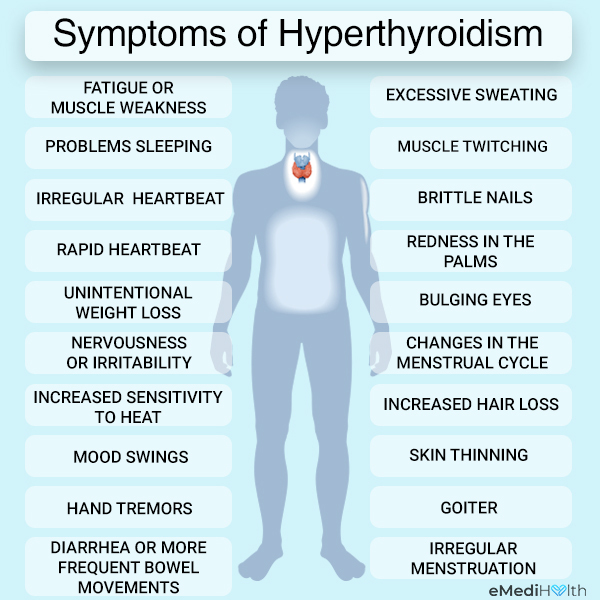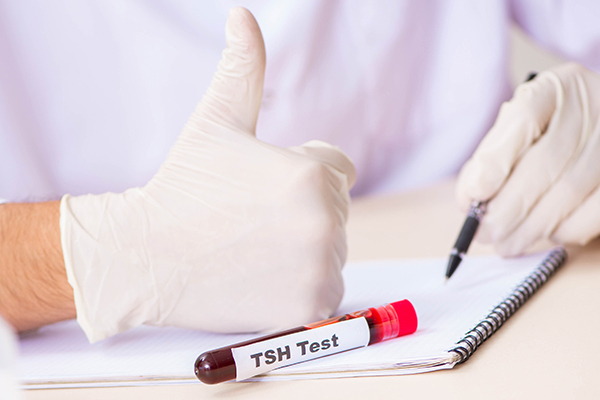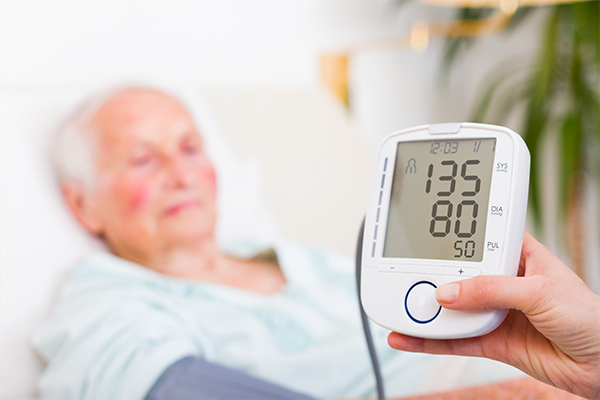In this article:
The thyroid is a small butterfly-shaped gland that releases a hormone involved in the regulation of the body’s energy and metabolism.

An overactive thyroid gland causes elevated levels of thyroid hormones which can affect the entire body and can result in dizziness, fluctuations in weight, feeling hot, increased blood pressure, increased heart rate, and fatigue. This condition is known as hyperthyroidism.
Hyperthyroidism occurs in about 1.3% of the US population and is more likely to occur in women, especially those over 60 years old. A timely diagnosis of an overactive thyroid is imperative to stabilize the condition and prevent future complications.
Causes of Hyperthyroidism

Common causes of hyperthyroidism include the following:
1. Graves’ disease
Graves’ disease is an autoimmune disease where the immune system sees part of the thyroid as a foreign body, like a bacteria or virus, and makes an antibody to combat it. Graves’ disease normally affects women between the ages of 20 and 40 years.
2. A toxic nodule or toxic multinodular goiter
A toxic nodule or toxic multinodular goiter is another cause of hyperthyroidism due to inappropriate thyroid hormone secretion. As women age, they are more likely to suffer from a toxic nodule or toxic multinodular goiter.
3. Thyroiditis
Often, hyperthyroidism occurs when the thyroid gland becomes inflamed and the stored thyroid hormone is released all at once. This condition is called thyroiditis. Thyroiditis is a transient condition that resolves on its own or can lead to hypothyroidism.
4. Other causes
Other causes of hyperthyroidism include excessive intake of thyroid hormone, excessive intake/exposure to iodine, abnormal secretion of TSH, and rarely tumors in the testes or ovaries.
Signs and Symptoms of Hyperthyroidism

It is important to remember that in the very early stages of hyperthyroidism, often called subclinical hyperthyroidism, a person may not have any noticeable symptoms at all, or they may be very subtle and nonspecific.
Hyperthyroidism can be indicated by various symptoms such as:
- Fatigue or muscle weakness
- Sleep troubles
- Irregular heartbeat (arrhythmia)
- Rapid heartbeat (palpitations)
- Unintentional weight loss
- Nervousness or irritability
- Diarrhea or more frequent loose stools
- Increased sensitivity to heat
- Mood swings
- Hand tremors
- Profuse sweating
- Twitching in the face and limbs
- Fragile nails that may become loose
- Red palms
- Protruding eyes in some cases
- Changes in the menstrual cycle or irregular menstruation
- Fine, brittle hair and hair loss
- Skin thinning
- Goiter, which involves an enlarged thyroid gland that gives a swollen appearance to the neck
How Is Hyperthyroidism Treated?
The best treatment option for hyperthyroidism depends on the cause and severity of the hyperthyroid state. The standard treatment methods are as follows.
1. Radioactive iodine
Radioactive iodine is used to curb the excessive production of hormones through the destruction of the thyroid gland.
It may take up to 6 months to see the full effect of the treatment. This will result in hypothyroidism in most cases, requiring thyroid hormone supplementation. Rarely, a second treatment dose may be needed.
Besides hypothyroidism, other side effects of radioactive iodine treatment include nausea, a metal taste in the mouth, and swollen salivary glands.
2. Medications
Two oral medications for hyperthyroidism are available, namely, methimazole and propylthiouracil (PTU). These medications interfere with how the thyroid makes the thyroid hormone.
Oral medications can be used to treat hyperthyroidism but do not normally offer a permanent cure. The most common side effects of antithyroid medications are hives, itching, and rashes. If antithyroid medications are needed in the first trimester of pregnancy, PTU is recommended. (1)
Sometimes, your doctor will give a beta-blocker to help treat the symptoms of hyperthyroidism. Beta-blockers slow down the heart rate, lower the blood pressure, and reduce the shaking of the hands (tremors) that are so common with hyperthyroidism.
3. Surgery/thyroidectomy
Surgical removal of the thyroid gland (thyroidectomy) is sometimes recommended. Occasionally, just the overactive/hyperfunctioning nodule or one lobe of the thyroid is removed. In other cases, subtotal or total thyroidectomy is performed.
Depending on the extent of the surgery, permanent hypothyroidism may result, requiring lifelong thyroid hormone supplementation.
How Is Hyperthyroidism Diagnosed?

The diagnosis of hyperthyroidism includes a study of your medical history and a physical exam. This is followed by blood tests to check your TSH, T3, and T4 levels. The normal range of T4 is suggested to be 77–155 nmol/l, T3 to be 1.2–2.8 nmol/L and TSH to be 0.3–4 mU/l. (2)
Hyperthyroidism is indicated by:
- Higher than normal levels of T3 and T4
- Lower than normal levels of TSH
Occasionally, other laboratory tests such as thyroid ultrasound, antibody test, and scans are needed, especially if thyroiditis or one of the rarer causes of hyperthyroidism is suspected:
Follow-Up Post Diagnosis
Once you have been diagnosed with hyperthyroidism, your doctor is likely to recommend a treatment method suitable for your condition.
To help you keep track of your health, doctors recommend that you must:
- Follow up with your doctor as recommended to assure you are responding to therapy.
- Monitor your thyroid hormone levels by getting a blood test done every 2–6 months.
Risk Factors
The likelihood of developing hyperthyroidism is more in women than in men. While the problem may develop in women in their early 30s, it is more likely to affect women over 60.
Other factors that can make you more prone to developing an overactive thyroid are:
- Personal or family medical history of a thyroid disorder or goiter
- Any autoimmune disease such as pernicious anemia, type 1 diabetes mellitus, rheumatoid arthritis, lupus, and primary adrenal insufficiency
- Pregnancy
- Certain heart medications that contain iodine
What Are the Complications of Untreated Hyperthyroidism?

Unaddressed hyperthyroidism can have severe complications that can have serious consequences on your overall health. These complications include:
- Graves’ ophthalmopathy
- Atrial fibrillation, which can lead to stroke
- Hypertension and congestive heart failure
- Osteoporosis, increasing the risk of fracture
- Muscle wasting, leading to difficulty in walking
- Thyroid storm
- In pregnant women, health complications to both the mother and the baby
When to See a Doctor
Make a note of your symptoms and consult your primary care physician or endocrinologist if you experience dizziness, rapid, irregular heartbeat, and elevated systolic blood pressure.
Expert Answers (Q&A)
Answered by Dr. Tharsan Sivakumar, MD (Endocrinologist)

Thyroid cancer has been linked to hyperthyroidism in a few cases. (3) The good news is that most people who have hyperthyroidism do not have thyroid cancer. Moreover, most people with thyroid cancer do not have any symptoms.
It is well understood that genetic factors can predispose an individual to develop hyperthyroidism, but the exact triggers are yet unknown. Extreme amounts of stress can precipitate thyroid dysfunction, but stress is not believed to be a common cause of hyperthyroidism.
Specifically, women are more likely to develop Graves’ disease, which is the most common type of hyperthyroidism. Therefore, it is said that women are more predisposed to hyperthyroidism than men.
Hyperthyroidism typically causes weight loss. Hypothyroidism typically causes weight gain.
In women, hyperthyroidism can cause lighter periods and/or menstrual irregularity, which can reduce fertility.
In men, hyperthyroidism can reduce sperm count, which can reduce fertility. Thus, if an individual has hyperthyroidism, it is important to treat the condition and normalize the thyroid hormone levels before trying to conceive.
Final Word
Hyperthyroidism can adversely affect your entire body. Often, antithyroid medications are only required when someone is extremely hyperthyroid.
Aside from the standard medications used to treat an overactive thyroid, dietary changes and yoga can be introduced into your routine to help your body stabilize the levels of thyroid hormones.

- Was this article helpful?
- YES, THANKS!NOT REALLY



